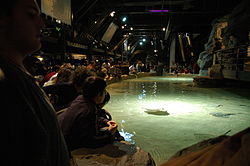Aquarium of Genoa
 From Wikipedia - Reading time: 6 min
From Wikipedia - Reading time: 6 min
| Aquarium of Genoa | |
|---|---|
 | |
 | |
| 44°24′37.04″N 8°55′35.57″E / 44.4102889°N 8.9265472°E | |
| Date opened | 1992[2] |
| Location | |
| Land area | 33,000 sq ft (3,100 m2) |
| Floor space | (10,000 m2 (110,000 sq ft) of exhibit space) |
| No. of species | 500+[3] |
| Total volume of tanks | 6,000,000 litres (1,300,000 imp gal; 1,600,000 US gal)[1] |
| Annual visitors | 1.2 million+ (2008)[4] |
| Memberships | EAZA[5] |
| Website | www |
The Aquarium of Genoa (Italian: Acquario di Genova) is the largest aquarium in Italy.[3] Located in the Old Harbour area of Genoa, Italy, the 33,000-square-foot (3,100 m2) aquarium is a member organization of the European Association of Zoos and Aquaria (EAZA), and welcomes more than 1.2 million visitors each year.
History
[edit]The aquarium was originally built for Genoa Expo '92 (International Exhibition Genoa '92 Colombo '92), celebrating 500 years since the Genoese sailor Christopher Columbus discovered the new world. The building, which some say looks like a ship ready to head out to sea, was designed by the Genoese architect Renzo Piano of the Renzo Piano Building Workshop. The interior design and initial exhibits for the opening in 1992 were designed by Peter Chermayeff leading a design team at Cambridge Seven Associates.[6] In 1998 the aquarium was expanded with the addition of a 100-metre (330 ft) ship connected by walkway to the original building.[7]

Exhibits
[edit]The original exhibition concept was to show the Ligurian Sea, the North Atlantic and Caribbean reefs "from two perspectives, one the New World/Old World encounter of 1492, the other the ecological awareness of 1992 and the present."[6]
The aquarium includes 70 tanks containing a total of 6,000,000 liters (1,300,000 imp gal; 1,600,000 U.S. gal), and almost 10,000 meters (33,000 ft) of exhibit space.[1]
The tanks host 12.000 animals of 400 different species including fishes, marine mammals, birds, reptiles, amphibians and invertebrates. Among these are dolphins, sea cows, sharks, seals, rays, boas, jellyfishes and penguins.[8]
Conservation
[edit]The Aquarium of Genoa coordinates the AquaRing EU project, and provides scientific expertise and content for AquaRing, including documents, images, academic content, and interactive online courses, via its Online Resource Centre.[2]
Gallery
[edit]
|
References
[edit]- ^ a b L‘aquarium de Gênes et la sensibilisation à l‘environnement
- ^ a b "Accessible and Qualified Use of Available Digital Resources about Aquatic World In National Gatherings". aquaringweb.eu. AquaRing. Archived from the original on 12 October 2007. Retrieved 10 September 2011.
- ^ a b "The Largest Aquariums in Europe". usatoday.com. USA Today. Retrieved 11 September 2011.
- ^ "Touring Club Italiano - Dossier Musei 2009" (PDF). touring.it. Touring Club Italiano. p. 4. Archived from the original (PDF) on 18 April 2012. Retrieved 11 September 2011.
- ^ "EAZA Member Zoos & Aquariums". eaza.net. EAZA. Retrieved 11 September 2011.
- ^ a b "Peter Chermayeff LLC". peterchermayeff.com. Peter Chermayeff LLC. Archived from the original on 19 April 2012. Retrieved 11 September 2011.
- ^ "Genoa for Visitors: Aquarium". genovagando.it. Genoa for Visitors. Archived from the original on 15 January 2012. Retrieved 11 September 2011.
- ^ Official site (italian language)
 KSF
KSF



















